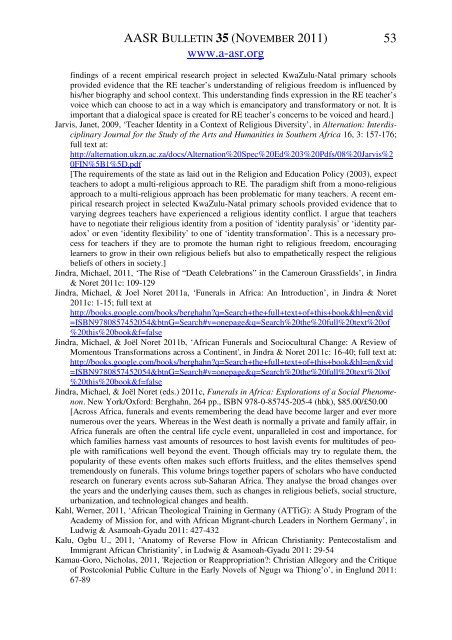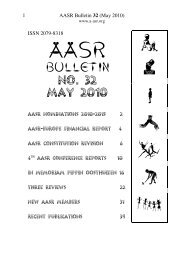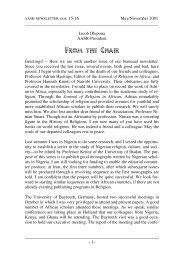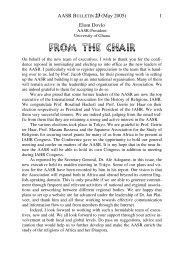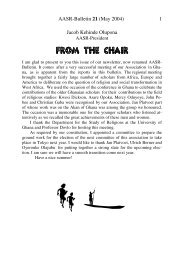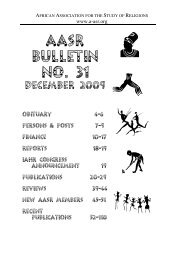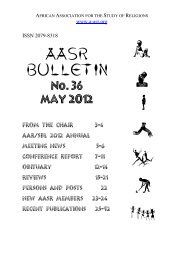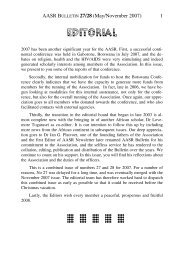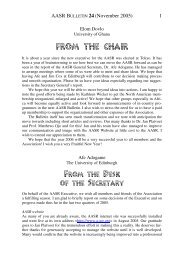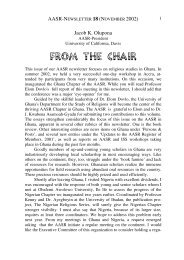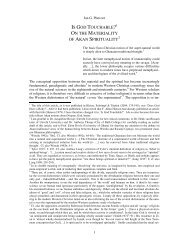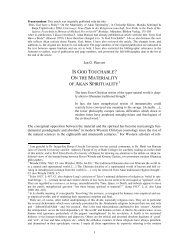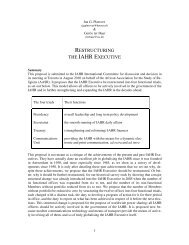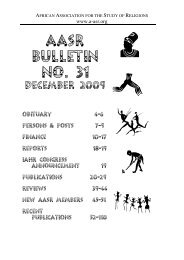AASR Bulletin 35 - The African Association for the Study of Religions
AASR Bulletin 35 - The African Association for the Study of Religions
AASR Bulletin 35 - The African Association for the Study of Religions
You also want an ePaper? Increase the reach of your titles
YUMPU automatically turns print PDFs into web optimized ePapers that Google loves.
<strong>AASR</strong> BULLETIN <strong>35</strong> (NOVEMBER 2011)<br />
www.a-asr.org<br />
53<br />
findings <strong>of</strong> a recent empirical research project in selected KwaZulu-Natal primary schools<br />
provided evidence that <strong>the</strong> RE teacher’s understanding <strong>of</strong> religious freedom is influenced by<br />
his/her biography and school context. This understanding finds expression in <strong>the</strong> RE teacher’s<br />
voice which can choose to act in a way which is emancipatory and trans<strong>for</strong>matory or not. It is<br />
important that a dialogical space is created <strong>for</strong> RE teacher’s concerns to be voiced and heard.]<br />
Jarvis, Janet, 2009, ‘Teacher Identity in a Context <strong>of</strong> Religious Diversity’, in Alternation: Interdisciplinary<br />
Journal <strong>for</strong> <strong>the</strong> <strong>Study</strong> <strong>of</strong> <strong>the</strong> Arts and Humanities in Sou<strong>the</strong>rn Africa 16, 3: 157-176;<br />
full text at:<br />
http://alternation.ukzn.ac.za/docs/Alternation%20Spec%20Ed%203%20Pdfs/08%20Jarvis%2<br />
0FIN%5B1%5D.pdf<br />
[<strong>The</strong> requirements <strong>of</strong> <strong>the</strong> state as laid out in <strong>the</strong> Religion and Education Policy (2003), expect<br />
teachers to adopt a multi-religious approach to RE. <strong>The</strong> paradigm shift from a mono-religious<br />
approach to a multi-religious approach has been problematic <strong>for</strong> many teachers. A recent empirical<br />
research project in selected KwaZulu-Natal primary schools provided evidence that to<br />
varying degrees teachers have experienced a religious identity conflict. I argue that teachers<br />
have to negotiate <strong>the</strong>ir religious identity from a position <strong>of</strong> ‘identity paralysis’ or ‘identity paradox’<br />
or even ‘identity flexibility’ to one <strong>of</strong> ‘identity trans<strong>for</strong>mation’. This is a necessary process<br />
<strong>for</strong> teachers if <strong>the</strong>y are to promote <strong>the</strong> human right to religious freedom, encouraging<br />
learners to grow in <strong>the</strong>ir own religious beliefs but also to empa<strong>the</strong>tically respect <strong>the</strong> religious<br />
beliefs <strong>of</strong> o<strong>the</strong>rs in society.]<br />
Jindra, Michael, 2011, ‘<strong>The</strong> Rise <strong>of</strong> “Death Celebrations” in <strong>the</strong> Cameroun Grassfields’, in Jindra<br />
& Noret 2011c: 109-129<br />
Jindra, Michael, & Joel Noret 2011a, ‘Funerals in Africa: An Introduction’, in Jindra & Noret<br />
2011c: 1-15; full text at<br />
http://books.google.com/books/berghahnq=Search+<strong>the</strong>+full+text+<strong>of</strong>+this+book&hl=en&vid<br />
=ISBN9780857452054&btnG=Search#v=onepage&q=Search%20<strong>the</strong>%20full%20text%20<strong>of</strong><br />
%20this%20book&f=false<br />
Jindra, Michael, & Joël Noret 2011b, ‘<strong>African</strong> Funerals and Sociocultural Change: A Review <strong>of</strong><br />
Momentous Trans<strong>for</strong>mations across a Continent', in Jindra & Noret 2011c: 16-40; full text at:<br />
http://books.google.com/books/berghahnq=Search+<strong>the</strong>+full+text+<strong>of</strong>+this+book&hl=en&vid<br />
=ISBN9780857452054&btnG=Search#v=onepage&q=Search%20<strong>the</strong>%20full%20text%20<strong>of</strong><br />
%20this%20book&f=false<br />
Jindra, Michael, & Joël Noret (eds.) 2011c, Funerals in Africa: Explorations <strong>of</strong> a Social Phenomenon.<br />
New York/Ox<strong>for</strong>d: Berghahn, 264 pp., ISBN 978-0-85745-205-4 (hbk), $85.00/£50.00<br />
[Across Africa, funerals and events remembering <strong>the</strong> dead have become larger and ever more<br />
numerous over <strong>the</strong> years. Whereas in <strong>the</strong> West death is normally a private and family affair, in<br />
Africa funerals are <strong>of</strong>ten <strong>the</strong> central life cycle event, unparalleled in cost and importance, <strong>for</strong><br />
which families harness vast amounts <strong>of</strong> resources to host lavish events <strong>for</strong> multitudes <strong>of</strong> people<br />
with ramifications well beyond <strong>the</strong> event. Though <strong>of</strong>ficials may try to regulate <strong>the</strong>m, <strong>the</strong><br />
popularity <strong>of</strong> <strong>the</strong>se events <strong>of</strong>ten makes such ef<strong>for</strong>ts fruitless, and <strong>the</strong> elites <strong>the</strong>mselves spend<br />
tremendously on funerals. This volume brings toge<strong>the</strong>r papers <strong>of</strong> scholars who have conducted<br />
research on funerary events across sub-Saharan Africa. <strong>The</strong>y analyse <strong>the</strong> broad changes over<br />
<strong>the</strong> years and <strong>the</strong> underlying causes <strong>the</strong>m, such as changes in religious beliefs, social structure,<br />
urbanization, and technological changes and health.<br />
Kahl, Werner, 2011, ‘<strong>African</strong> <strong>The</strong>ological Training in Germany (ATTiG): A <strong>Study</strong> Program <strong>of</strong> <strong>the</strong><br />
Academy <strong>of</strong> Mission <strong>for</strong>, and with <strong>African</strong> Migrant-church Leaders in Nor<strong>the</strong>rn Germany’, in<br />
Ludwig & Asamoah-Gyadu 2011: 427-432<br />
Kalu, Ogbu U., 2011, ‘Anatomy <strong>of</strong> Reverse Flow in <strong>African</strong> Christianity: Pentecostalism and<br />
Immigrant <strong>African</strong> Christianity’, in Ludwig & Asamoah-Gyadu 2011: 29-54<br />
Kamau-Goro, Nicholas, 2011, 'Rejection or Reappropriation: Christian Allegory and <strong>the</strong> Critique<br />
<strong>of</strong> Postcolonial Public Culture in <strong>the</strong> Early Novels <strong>of</strong> Ngugı wa Thiong’o’, in Englund 2011:<br />
67-89


